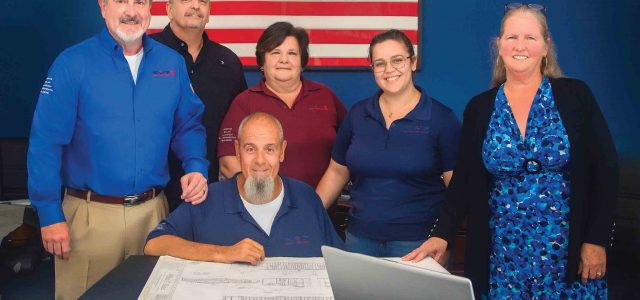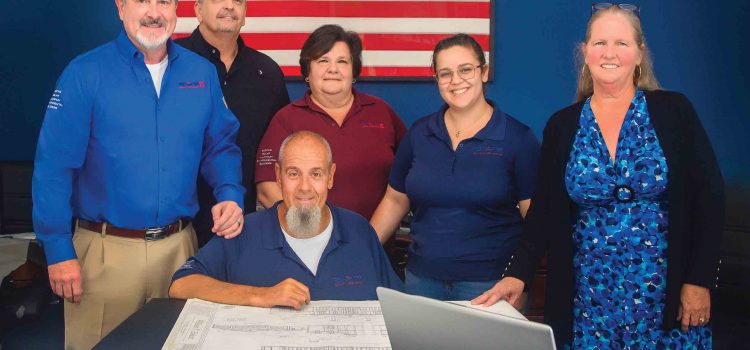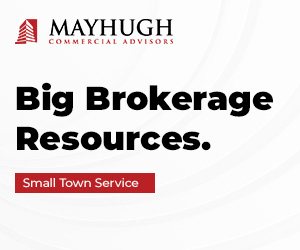


Joseph K. Lamb Jr. followed in his father’s footsteps into the roofing industry. Starting at the age of 13, he began gaining experience at his dad’s company on Florida’s east coast, pressure-cleaning roofs and helping to haul pea gravel and hot asphalt.
Lamb Jr. became a Florida licensed roofing contractor and Florida licensed building contractor in the 1990s and served as project manager for the largest asphalt shingle project in the United States at The Bluffs in Jupiter. When his father’s company expanded to Naples, he ran that division until forming his own contracting company, Lamb Construction Group, in 1997. In 1999, he started Gulf Western Roofing under the construction group after seeing a need in the area.
“I worked for my father in the roofing industry for 15 years,” says Lamb Jr. “And it gave me enough motivation and understanding of the industry to pursue my own business.”
Bonita Springs–based Gulf Western Roofing now works throughout Southwest and Central Florida, servicing clients from Collier County all the way up to St. Johns County. It offers roof installation, maintenance, and repair services for residential and commercial customers, as well as solar panel installation and hurricane response services.
The company’s staff of up to 275 (depending on the time of year) includes a number of managers who have been with the firm for at least 15 years. “In terms of roofing technology and know-how, we have over 200 years of experience collectively,” says Lamb Jr.
He himself has managed the installation of more than 3 million square feet of roofing products over his four decades in the business. He was one of the first contractors in the nation to be certified by the Roofing Sciences Institute in Denver and is one of only three RISE Certified Solar Roofing Professionals in Florida.
“Joe’s knowledge and his experience is phenomenal,” says Nick Stefanis, chief strategy officer for Gulf Western Roofing and a partner in the business with Lamb Jr. and Keith Reece. “I haven’t met too many people who can be as dynamic as he is. I’d put him up against any owner out there.”
Gulf Western Roofing celebrated its 25th anniversary in 2024, and Lamb Jr. can point to several reasons for its longevity. “It’s really the values that we’ve adhered to,” he says. “It’s been 25 years of providing a high-quality product at a fair price.”
The relationships the company has built with its clients over its years in business also play a big part in its success. “The customer has trust in us,” says Lamb Jr. “It’s really about honoring what we told them we would do. And because of those relationships, we’re able to endure… It boils down to the relationships and just standing behind what you tell people you’re going to do.”
A big differentiator for the company? “We actually honor our warranty,” says Lamb Jr. “If something goes wrong, then we’re there to fix it.”
Gulf Western Roofing also considers jobsite safety a business imperative. The company invests in continuous safety training and rigorous compliance protocols across all crews to protect its workers, provide peace of mind for its clients, and prevent fines, project delays or even full shutdowns that could result from unsafe practices.
CARING FOR CUSTOMERS
Empathy is one of the company’s core values, and it knows that a roofing project isn’t easy on customers. “The reroofing process is annoying,” says Lamb Jr. “It’s noisy; it’s messy…We understand that what they want is for us to put the roof on quickly and efficiently and get out of their hair.
“We also understand what an incredible commitment and investment this is to protect your most valuable asset,” he continues. “So we hold our customers’ hands throughout the entire thing and stay in constant communication with them.”
“They’re very conscientious,” says Phil Wood, CEO of John R. Wood Christie’s International Real Estate, who has hired Gulf Western Roofing to replace the roofs on his personal home and two commercial buildings. “They’re very concerned about how their work will affect the homeowner or owner of the building they’re working on.
“I have recommended them a number of times,” he continues. “I feel like they do a great job, and I was very pleased with their work.”
In fact, the metal roof the company installed on his home has gone through three serious hurricanes with no issues. “I have had no problem at all—not the slightest thing,” says Wood.
It’s that kind of conscientiousness and care for the customer that helps the company stand out from the crowd. “When you put a roof on in Florida, everybody has to follow the code,” says Stefanis. “One guy’s not putting on a roof differently than the other guys. It’s how you’re managing your business internally that sets you apart. It’s the client relationships; it’s the vendor relationships. When you have those entrenched strong partnerships, it gives you the ability to have a competitive advantage.”
Hurricanes are a fact of life in these parts, and they can put both the company’s past work and its relationships to the test, especially when people swoop in after a storm looking to make a quick buck. “It more or less raises the stakes for those of us who have those relationships with material suppliers and labor groups and employees,” says Lamb Jr.
Gulf Western Roofing also works to ensure client relationships stay strong after a storm. “We don’t abandon our customers and chase all the inflated work and the inflated pricing,” says Lamb Jr. “We remain loyal to our customers and get their work done. We work together instead of just abandoning them and chasing re-roofings and repairs. Those decisions and dedication to the customer and what we’ve told them we would do are honestly one of the biggest reasons we’ve had these relationships this long.”
Tougher building codes implemented in the state since Hurricane Andrew have proven effective in Lamb Jr.’s experience, but he’s watching a new development in the Florida roofing industry closely.
“There’s a lot of discussion right now about the asphalt shingle roof in Florida and how valid it is to provide adequate resistance to hurricane-force winds, especially after the roof ages,” he says. “Asphalt shingles perform best in the first three years of existence. But as those shingles age, they lose their adhesive capability, and they tend to blow off the older the roof gets. Because of this, the insurance industry and state lawmakers are engaged in conversations right now on how to address this, and it may provide incentives to use metal roofing or tile roofing instead of shingles.”
RISING ABOVE CHALLENGES
For the company’s commercial clients, new advancements in adhesives are proving beneficial. “The industry is producing some incredible adhesives and coatings to enhance an existing roof system for several years,” says Lamb Jr. “Because of that, a lot of the big box stores and warehouses are moving to coatings instead of just tearing the roof off and reinstalling it. It’s more costeffective than putting on a new roof.”
When it comes to the company’s solar business, Lamb Jr. has seen the technology evolve at an incredible pace. “Five years ago, most of the available panels could only convert 17% of the energy they received to energy we could use,” he says. “Now the panels are achieving results of up to 40% or even more. Which means the panels can get smaller, and as they get smaller, they use less materials and become more affordable.”
He’s also seeing “some incredible stuff on the horizon with flexible solar panels, panels that you can roll up like you roll up a set of blueprints.” But solar remains a somewhat challenging sector in the state of Florida, and he says the biggest reason why is the state’s relatively young age.
When you compare Florida’s infrastructure to someplace like Detroit or Alexandria, Va., it’s much newer and therefore more efficient. This means the cost per kilowatt of electricity is cheaper in Florida than in areas with older infrastructure.
“When you lay down $20,000 for a system in, say, Detroit, it’s going to pay for itself faster than one in Florida,” says Lamb Jr. The longer length of time until a Florida solar installation pays for itself can make it less appealing to customers.
Hurricanes have been just one challenge Gulf Western Roofing has had to endure over its more than two decades in business. Economic downturns, real estate affordability and supply chain issues have also impacted the company over the years.
“The newest challenges with the new administration in D.C. are immigration and possible tariffs,” says Lamb Jr. “Tariff discussions are causing a mild level of chaos in terms of price control and the supply chain. Immigration has impacts on labor.
“So it falls back to the trust we have built with our repeat customers and our suppliers,” he continues. “This isn’t the first time tariffs have been implemented; this isn’t the first time supply chains have been disrupted. There’s always a crisis in the building business, and if you have the relationships and gain the trust of your customers, that’s really what helps you get through it.”
“The most important thing is, we really care about what we do,” says Stefanis. “We try to be the best at whatever we do. We don’t just put on a great roof. We run a great company, which makes our people happy. We have a high level of integrity and character and do things the right way—and we stick by that.”








